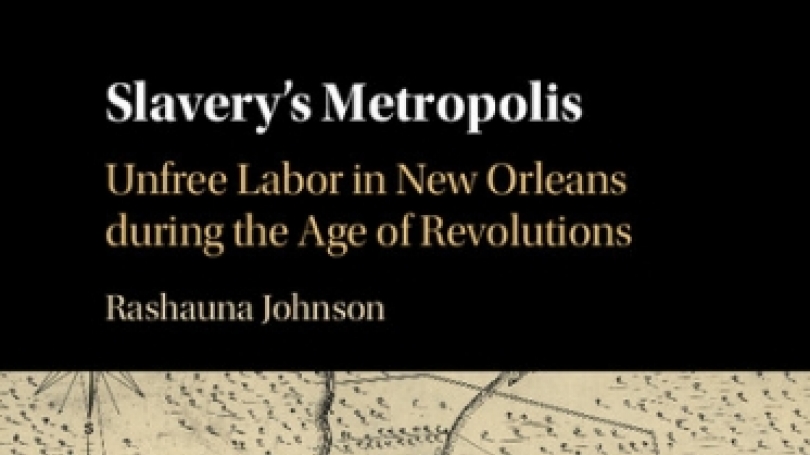
- Undergraduate
- Foreign Study
- Research
- News & Events
- People
Back to Top Nav
Back to Top Nav
Back to Top Nav
Press release from Yale University:
Yale announces 2017 Frederick Douglass Book Prize
New Haven, Conn.— Yale University’s Gilder Lehrman Center for the Study of Slavery,
Resistance, and Abolition today has announced the finalists for the 19th annual Frederick
Douglass Book Prize, one of the most coveted awards for the study of the African American
experience. Jointly sponsored by the Gilder Lehrman Institute of American History and the
Gilder Lehrman Center for the Study of Slavery, Resistance, and Abolition at Yale University,
this annual prize of $25,000 recognizes the best book on slavery, resistance, and/or abolition
published in the preceding year.
The finalists are: Alfred L. Brophy for “University, Court, and Slave: Pro-slavery Thought in
Southern Colleges and Courts and the Coming of Civil War” (Oxford University Press);
Rashauna Johnson for “Slavery’s Metropolis: Unfree Labor in New Orleans during the Age of
Revolutions” (Cambridge University Press); and Manisha Sinha for “The Slave’s Cause: A
History of Abolition” (Yale University Press).
The winner will be announced following the Douglass Prize Review Committee meeting in the
fall, and the award will be presented at a celebration in New York City on February 22, 2018.
A jury of scholars that included Christopher Hager (Chair), of Trinity College; Daina Ramey
Berry, of the University of Texas at Austin; and Oscar de la Torre, of the University of North
Carolina-Charlotte selected this year’s finalists from a field of approximately 80 nominations.
The jury’s descriptions of those works follow. In “University, Court, and Slave: Pro-Slavery
Thought in Southern Colleges and Courts and the Coming of Civil War,” Alfred L. Brophy
presents an intellectual history of the southern elite in antebellum America. In addition to
showing how a reluctant, "necessary evil" view of slavery evolved into a militant, "positive
good" argument, Brophy reveals the ways academic thought expanded into the South's
jurisprudence, policy, and culture. This portrait of a society driven by fear toward contorted
rationalizations expands our understanding of the forces devoted to perpetuating slavery. With
this viewpoint, scholars now have a stronger foundation to interpret the legal history of slavery
and the intellectual underpinnings of pro- and anti-slavery thought.
In “Slavery's Metropolis: Unfree Labor in New Orleans during the Age of Revolutions,”
Rashauna Johnson examines the lives of enslaved people in the South's largest city. By analyzing
the laconic records of immigration, trade, and crime, Johnson reconstructs in vivid detail the
street life, mobility, and "confined cosmopolitanism" of African Americans in New Orleans.
This innovative study of urban slavery reveals enslaved people's connections to each other and to
the Caribbean, the European empires that shaped New Orleans, and the rest of the U.S. South.
Johnson's contribution to the historiography of slavery expands our understanding of the global
dimensions of an important trading center though the eyes of those most affected, the enslaved.
The new definitive history of American abolitionism, Manisha Sinha's “The Slave's Cause: A
History of Abolition” provides a compendious account of a two-century long “radical,
democratic movement.” Challenging a historical narrative often skeptical of white anti-slavery
activists, Sinha tells the story of an effort that was interracial in constitution and international in
scope. In Sinha's study, the fight to end slavery in the United States is a more cohesive
movement than previously recognized and a pivotal part of the history of human rights. “The
Slave's Cause” represents an important contribution to our understanding of abolition, one that
will shape the field from this point forward.
The Frederick Douglass Book Prize was established by Gilder Lehrman in 1999 to stimulate
scholarship in the field by honoring outstanding accomplishments. Previous winners are Ira
Berlin and Philip D. Morgan in 1999; David Eltis, 2000; David Blight, 2001; Robert Harms and
John Stauffer, 2002; James F. Brooks and Seymour Drescher, 2003; Jean Fagan Yellin, 2004;
Laurent Dubois, 2005; Rebecca J. Scott, 2006; Christopher Leslie Brown, 2007; Stephanie
Smallwood, 2008; Annette Gordon-Reed, 2009; Siddharth Kara, Judith Carney, and Richard N.
Rosomoff, 2010; Stephanie McCurry, 2011; James Sweet, 2012; Sydney Nathans, 2013;
Christopher Hager, 2014; Ada Ferrer, 2015; and Jeff Forret, 2016.
The award is named for Frederick Douglass (1818–1895), the one-time slave who escaped
bondage to emerge as one of the great American abolitionists, reformers, writers, and orators of
the 19th century.
The Gilder Lehrman Center for the Study of Slavery, Resistance, and Abolition, which is
supported by The Whitney and Betty MacMillan Center for International and Area Studies at
Yale, was launched in November 1998 through a generous donation by philanthropists Richard
Gilder and Lewis Lehrman and the Gilder Lehrman Institute of American History. Its mission is
to advance the study of all aspects of slavery and its destruction across all borders and time. The
Center seeks to foster an improved understanding of the role of slavery, slave resistance,
abolition, and their legacies in the founding of the modern world by promoting interaction and
exchange between scholars, teachers, and public historians through publications, educational
outreach, and other programs and events. For further information on events and programming,
visit glc.yale.edu or contact the Center by phone at (203) 432-3339 or e-mail
gilder.lehrman.center@yale.edu.
Founded in 1994 by philanthropists Richard Gilder and Lewis E. Lehrman, the Gilder Lehrman
Institute of American History is the leading American history nonpro fit organization dedicated to
K-12 education. With a focus on primary sources, the Gilder Lehrman Institute illuminates the
stories, people and moments that inspire students of all ages and backgrounds to learn and
understand more about history. Through a diverse portfolio of education programs, including the
acclaimed Hamilton Education Program, the Gilder Lehrman Institute provides opportunities for
nearly two million students, 30,000 teachers and 13,000 schools worldwide. The Institute’s
programs have been recognized by awards from the White House, the National Endowment for
the Humanities, and the Organization of American Historians. For further information, visit
gilderlehrman.org or call (646) 366-9666.
# # #